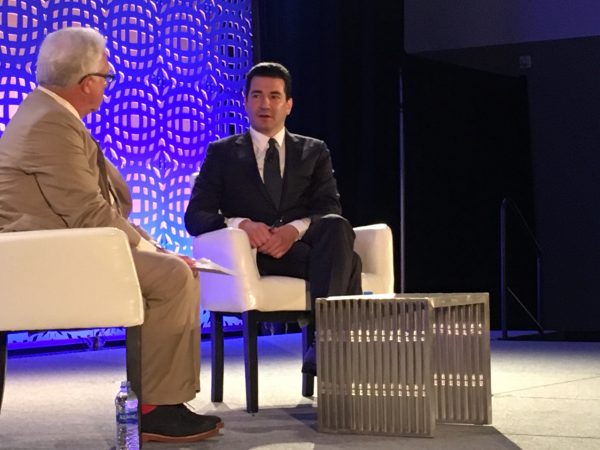
FDA Commissioner Scott Gottlieb speaks in a fireside chat at BIO 2018.
Less than four months after resigning as Food and Drug Administration commissioner, Scott Gottlieb has taken on his latest gig: board member of one of the world’s largest drugmakers.
New York-based Pfizer said Thursday that Gottlieb had joined its board of directors and was also appointed to the boards regulatory and compliance and science and technology committees.
Gottlieb resigned as FDA commissioner in March, following a nearly two-year stint at the agency that saw the approvals of numerous novel treatments, including the first CAR-T cell therapies for cancers, the first gene therapy for an inherited disease and the first RNA-interference therapy. Following his resignation, National Cancer Institute Director Ned Sharpless was appointed acting commissioner. Meanwhile, Gottlieb went back to his previous roles, at conservative think tank the American Enterprise Institute and at the venture capital fund New Enterprise Associates, both organizations he had worked for prior to his appointment at the FDA.
“Scott’s expertise in healthcare, public policy and the industry will be an asset to our company and enable our shareholders to continue to benefit from a board representing a balance of experience, competencies and perspectives,” Pfizer Executive Chairman Ian Read said in a statement.
However, the announcement also provoked several negative reactions, particularly on social media, from those who saw the move as an example of a “revolving door” between government and industry. “It’s going to be pretty cool to watch all those $PFE drugs win FDA approval on mouse data. Good work, Scott!” STAT biotech journalist Adam Feuerstein wrote on Twitter Thursday.
“Our country needs to stop the revolving door between our government and the organizations they are mandated to oversee. #Soldout,” wrote Twitter user Marci Venable under Gottlieb’s tweet announcing the new role.

A Deep-dive Into Specialty Pharma
A specialty drug is a class of prescription medications used to treat complex, chronic or rare medical conditions. Although this classification was originally intended to define the treatment of rare, also termed “orphan” diseases, affecting fewer than 200,000 people in the US, more recently, specialty drugs have emerged as the cornerstone of treatment for chronic and complex diseases such as cancer, autoimmune conditions, diabetes, hepatitis C, and HIV/AIDS.
Numerous other comments on Gottlieb’s tweet and elsewhere on Twitter were also highly critical.
Gottlieb did not respond to a request for comment. Pfizer did not provide a comment in time for publication.
Concerns about Gottlieb’s ties to the drug industry arose during his 2017 confirmation hearings, raising questions about his ability to be impartial. However, he agreed to recuse himself of decisions involving companies he had worked for. And once he had taken his post, he devoted considerable energy to using the FDA’s existing powers to tackle the issue of high drug costs, despite the agency historically not being focused on pricing.
Photo: Alaric DeArment, MedCity News













